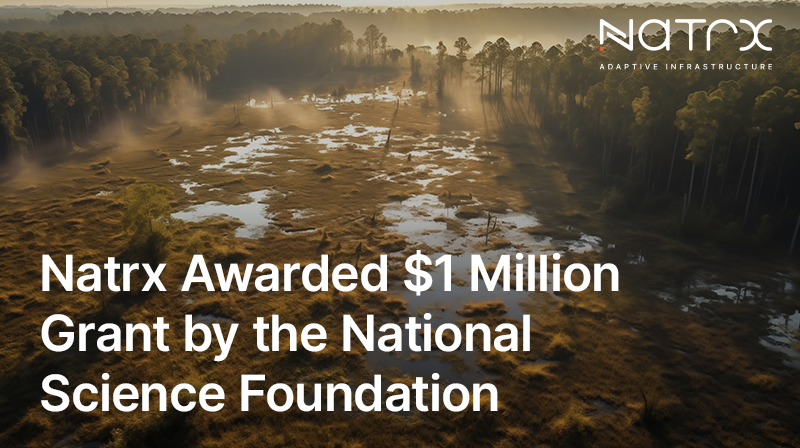Natrx Awarded $1 Million Grant by the National Science Foundation to Develop Technology for Measuring Carbon Value in Coastal Wetlands
Small Business Innovation Research Program Funds R&D
to Fuel “Blue Carbon Economy”
RALEIGH, N.C. (Nov. 14, 2023) – Leading climate tech company Natrx has been awarded a National Science Foundation (NSF) Small Business Innovation Research (SBIR) grant to continue development of its remote-sensing technology designed to quantify the economic value of carbon stock in coastal wetlands. The $1 million award to advance Natrx’s Resilience for Waterfront Infrastructure (REWIRE) platform is also eligible for additional matching funds from NSF that would push the grant total to $1.7 million.
Natrx’s technology and data-driven approach to carbon and biodiversity accounting in wetland ecosystems will lead to the emergence of sustainable new business models. The REWIRE platform will also facilitate private financing of nature-based restoration projects that protect communities and fuel local economies. Natrx’s innovative approach integrates remotely-sensed and field-based data, and applies artificial intelligence (AI) algorithms to map coastal erosion rates, blue carbon, and biodiversity at high spatial resolution.
“The REWIRE platform will be a critical tool in appraising the carbon value that exists in coastal areas,” said Leonard Nelson, CEO of Natrx. “We are deeply appreciative of the continued recognition and investment from NSF that will help unlock value that can lead to sustainable, blue carbon economies where they’re needed most.”
In 2021, Natrx was also awarded NSF funding for Phase I of this project. Phase I focused on the development of AI and geospatial software tools for assessing hyper-local, hydrodynamic and erosive conditions at high resolution.
As part of Phase II, the Center for Geospatial Analytics at North Carolina State University will help power the geospatial processing capabilities of the REWIRE approach using the GRASS GIS open-source software. Dr. Vaclav Petras, Research Software Engineer at NC State, will oversee integration of GRASS GIS APIs into REWIRE.
“The collaboration with Natrx allows us to contribute to open-source software development by enhancing the existing tooling, and contribute to open science by making more algorithms readily available,” said Dr. Petras.
All initiatives considered by the NSF for SBIR grants undergo a rigorous merit-based review. The program supports scientific excellence and technological innovation that is moving from the lab to the market.
Most of the world's coastal habitats are vulnerable to erosion which can have wide-ranging negative impacts on local economies. Enhancing shoreline resilience and biodiversity can unlock the value of coastal ecosystems by supporting nature-based infrastructure, sustainable fisheries, tourism, and clean water. These “blue economy” opportunities offer environmental benefits as well as social benefits of economic equity and environmental justice for low-income and underserved communities.


